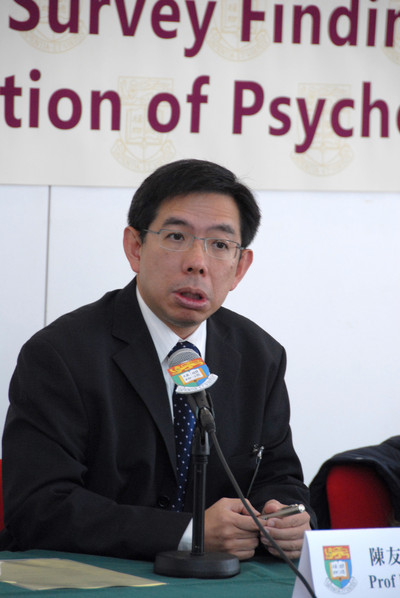HKU survey reveals negative attitudes despite improved understanding of psychosis
30 Dec 2014
To further study public awareness and knowledge on psychosis in Hong Kong, the Department of Psychiatry, Li Ka Shing Faculty of Medicine, The University of Hong Kong (HKU) carried out the first territory-wide local Public Awareness Survey on Psychosis, funded by the Hong Kong Jockey Club Charities Trust, in 2009 and a follow-up survey in 2014. Results show that despite some improvement on the knowledge and misconceptions about psychosis over the past five years, there is no significant improvement on attitude and discrimination towards individuals with psychosis. It reflects the importance of changing stereotypes of individuals with psychosis and correcting key misconceptions and needs for further tailored action.
Study Results Implication
Chief investigator of the study, Professor Eric YH Chen, Head and Clinical Professor of the Department of Psychiatry, Li Ka Shing Faculty of Medicine, HKU, comments, “International population studies have demonstrated an improvement of public knowledge about psychosis but a slight worsening of discrimination to patients with psychosis over a period of time. Public attitude and discrimination are shaped not only by public education, but also by various news media sources. In fact, research suggested that newspaper and TV portrayal of individuals with psychosis have a direct influence on public’s negative attitudes. Further studies are needed to investigate on the mechanisms behind the change of public attitude, particularly on the gender difference, to eliminate discrimination towards psychosis patients.”
One of the researchers, Dr Sherry KW Chan, Clinical Assistant Professor of the Department of Psychiatry, Li Ka Shing Faculty of Medicine, HKU points out, “The results reveal some reduction in common misconceptions of individuals with psychosis, which is encouraging. However, the attitude towards them is still negative, we hope that more tailor-made education programme will be carried out in the future to remove discrimination.”
Study Method and Findings
The current study was designed by the Department of Psychiatry, Li Ka Shing Faculty of Medicine, HKU and the HKU Public Opinion Programme (POP) was commissioned to carry out the survey. Territory-wide telephone interviews were carried out in 2009 and 2014, with stratified randomisation according to age and gender distribution of Hong Kong population. A total of 1,016 (46% male, 54% female) and 1,018 adult (45% male, 55% female) Hong Kong residents, over age 18, were successfully interviewed respectively in 2009 and 2014 with the same interviewing questionnaire.
In 2014, 62.5% of the participants believe that psychosis refers to split or multiple personalities, compared to 72.1% in 2009. Similarly, 47% associated psychosis with poor hygiene and odd behaviour in 2014, compared to 53.1% in 2009. There are also reductions of other common misconceptions: that psychosis can be treated successfully without drugs, and that they are dangerous to the public because of their violent behaviours.
The researchers also found differences between men and women. There is greater reduction in two stereotypes among women from 2009 to 2014: women associate psychosis less with odd behaviour and less with dangerousness because of their violent behaviour. Men, on the other hand, have a better knowledge about treatment of psychosis over time: fewer men perceive that psychosis can be treated without drugs in 2014 when compared to 2009.
However, there is no obvious change in the public attitude and discrimination towards individuals with psychosis. Comparing data in 2009 and 2014, the same proportion of participants reported that most of the employers would consider non-psychosis individuals’ applicants before individuals with psychosis (around 86%). Equal proportions of participants thought less of individuals with psychosis (around 52%) and that most of the people showed disrespect to the opinion of (around 70%). There is even a greater proportion (69.4%) of participants who believed that most of the people would not date individuals with psychosis in 2014.
Conclusions and suggestions
This first territory-wide public awareness survey on psychosis calls for further public education taking into the differential needs of different groups of people, focus on changing the stereotypes of individuals with psychosis, in addition to promoting an understanding of psychosis. Partnership with the media should be established in reducing the stigmatising effects of negative news reports.
About JCEP
Jockey Club Early Psychosis Project (JCEP) is a five-year early psychosis project at the University of Hong Kong funded by the Hong Kong Jockey Club Charities Trust started in 2009. This HK$68.82 million project involves intervention, research, and public education in early psychosis. The intervention team provides case management service to 1,000 patients with first episode psychosis. Its public education work includes public health talks at public libraries and schools, gate keeper training for frontline workers, and public exhibition at train stations, housing estates, and higher education institutes.
About Psychosis
Psychosis is a common mental condition including symptoms such as hallucinations, delusions, disorganised thoughts and speech. There are many causes of psychosis, and worldwide figures suggest that approximately 2-3 in 100 people would experience psychotic symptoms that are more enduring. Symptoms are resulted from an imbalance of certain chemicals in our brain (called neurotransmitters). Affected individuals are often gentle and not commonly display very strange or bizarre behaviour.
To use the press release photo(s) for any publishing, publicity and related purpose, photo courtesy should be given to “Li Ka Shing Faculty of Medicine, The University of Hong Kong”

Researchers from Department of Psychiatry, Li Ka Shing Faculty of Medicine, The University of Hong Kong (HKU) carried out the first territory-wide local Public Awareness Survey on Psychosis, funded by the Hong Kong Jockey Club Charities Trust, in 2009 and a follow-up survey in 2014. Results show that despite some improvement on the knowledge and misconceptions about psychosis over the past five years, there is no significant improvement on attitude and discrimination towards individuals with psychosis. Professor Eric YH Chen (Left), Head and Clinical Professor of the Department of Psychiatry, Li Ka Shing Faculty of Medicine, HKU and Dr Sherry KW Chan (Right), Clinical Assistant Professor of the Department of Psychiatry, Li Ka Shing Faculty of Medicine, HKU.

Chief investigator of the study, Professor Eric YH Chen, Head and Clinical Professor of the Department of Psychiatry, Li Ka Shing Faculty of Medicine, HKU, comments, “Public attitude and discrimination are shaped not only by public education, but also by various news media sources. In fact, research suggested that newspaper and TV portrayal of individuals with psychosis have a direct influence on public’s negative attitudes. Further studies are needed to investigate on the mechanisms behind the change of public attitude, particularly on the gender difference, to eliminate discrimination towards psychosis patients.”
